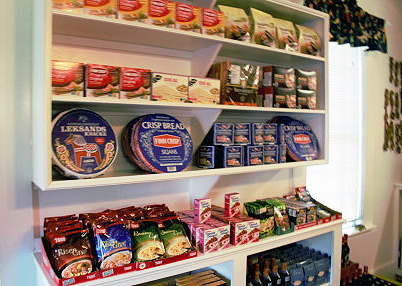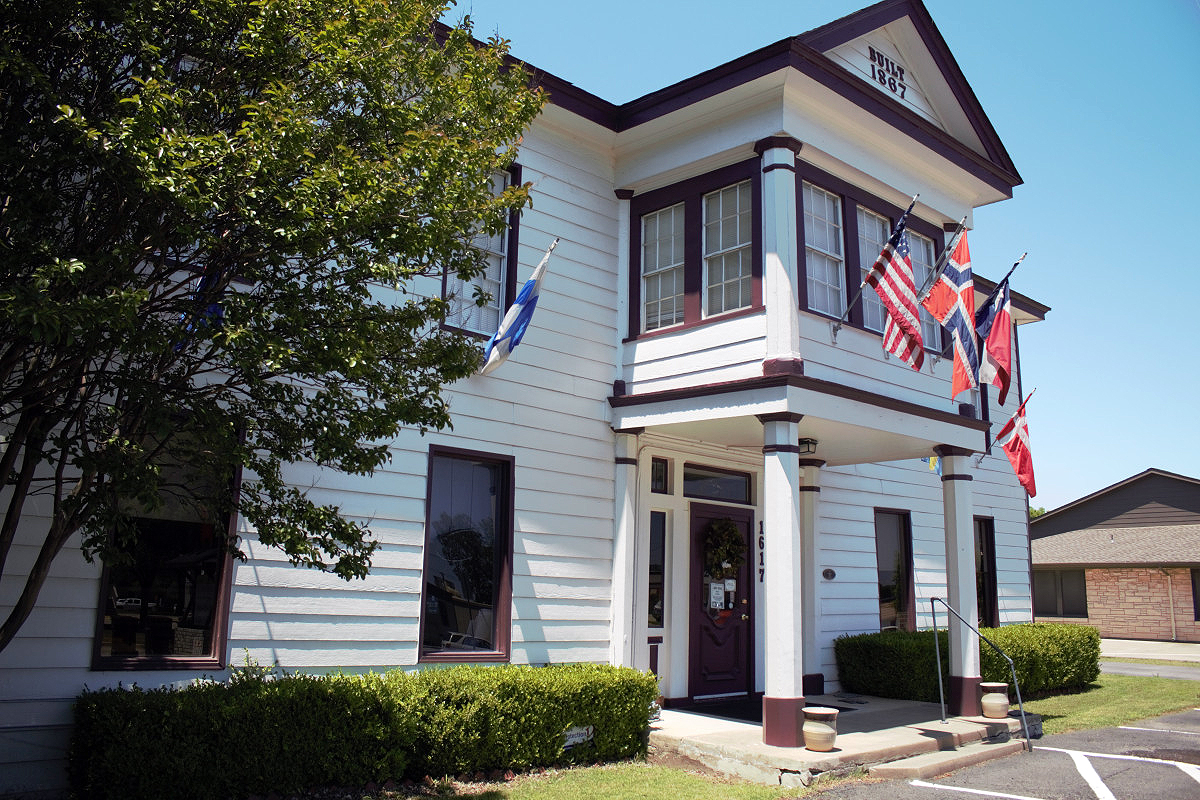Unusually Scandinavian
The Wooden Spoon in Plano, TX has historic character, yet homey feel all paired with more than a touch Scandinavian.
-
 Goat cheese, salted licorice and rosemaling ... all the things expat Scandinavians crave for.
Goat cheese, salted licorice and rosemaling ... all the things expat Scandinavians crave for. -
-
When Gwen Workman was asked to use her shop as part of a haunted house tour, she decided to offer cookies to the guests who came in. This would not be a haunted house filled with phantoms or vampires. It would be filled with trolls, nisse, and other “little people” of Scandinavian lore.
“I’d written three books about Magnus the Troll," Workman said. "So I began to tell them stories of the house, stories of me, stories of things that happened here. And they all left here smiling. Several of them have come back.”
The guests came back to a house built in 1867 and filled with such items as Swedish outfits, Norwegian candies and many, many wooden spoons. When not a haunted house, it is the Wooden Spoon, a shop for Scandinavian food, gifts, culture and history. One side features an array of cheeses, preserves, coffees, crackers and meats hailing from Sweden, Norway and Finland. The other side is home to love knots, Dala horses painted in Swedish designs and other gifts. -
 The house still stands on its ironwood foundations, filled with the scent of freshly baked cookies or fresh roast and a strong touch of Scandinavia.
The house still stands on its ironwood foundations, filled with the scent of freshly baked cookies or fresh roast and a strong touch of Scandinavia. -
-
Searching for home
Workman grew up in the Scandinavian community of Breivik, Minnesota, named after the Norwegian city.
“Everyone in the community, except for my father, was Scandinavian,” she said. “That’s all I knew. You cooked Norwegian. You took care of your house a certain way. You had animals. You did canning.”
After leaving Minnesota for Texas, Workman said everything felt different. “I missed my Scandinavian foods, people,” she said. “There’s a different mentality amongst all of our cultures. We deal differently with each other.”
It wasn’t until she saw and joined a Norwegian culture organization at the State Fair that she found the first hints of home.
“I could see a lot of people were moving here from all over the United States, from all over the world,” she said. “So I thought, ‘well, I can’t be the only half-Norwegian that’s moved to Texas.'”
She started a store in McKinney, catering and baking for about a year, and then went to Fairview Farms. She bought the Forman House in downtown Plano in 1992. Now, Workman's Wooden Spoon is a destination for anyone with a Nordic or Scandinavian interest. Each visitor has a favorite product that makes the trip special. -
Goat cheese, salted licorice and rosemaling
For Arne Hatlestad, it’s the goat's milk cheese. He comes at least once a week to shop at the store.
“Well, I’m born and raised in Norway,” he said. “So living here in Texas, this was coming home.”
Hatlestad is the cultural and social director of the Sons of Norway Nordtex Lodge, which meets monthly at the Wooden Spoon for a Norwegian potluck and presentation. The meetings have taken place at the Wooden Spoon for about 15 years.
Shelves are packed with Swedish foods next to Norwegian foods. “There’s a lot of similarities in cultures, but there’s a lot of big differences, and a lot of differences within the Scandinavian groups,” Workman said.
For Jeremy Martin, it’s the salmiak, or salted licorice. And seeing Finnish coffee on the shelves brings back memories of his travels to Finland.
The Dallas-Fort Worth Finnish-American Society president said the organization began having its meetings monthly there after its usual meeting place began a long remodelling process about two years ago.
Some members are close friends with Workman, Martin said, and this provided a chance for them to get to see her. She brings Lingonberry drinks to every meeting.
“It’s made the meetings more intimate,” he said. “And it’s a way for us to see Gwen a little more often than we typically would.”
The meetings give members a chance to keep the culture alive. Martin gives presentations on Finnish history and modern culture, such as the Finnish Civil War and singer Saara Aalto’s performances on The X Factor UK. While not a Scandinavian country, the country’s Nordic heritage makes the Wooden Spoon a destination for members. The shop also offers Finnish, Norwegian and Swedish language lessons.
For Julie Gentry, it was the rosemaling, a Norwegian folk art. After reading a Dallas Morning News article highlighting the art, Gentry decided to take classes with an instructor. When classes started at the Wooden Spoon, she began taking them in the upstairs rosemaling studio. “The technique of the shading, and the detail of the line work also makes it just interesting to look at,” she said. “It’s an old art that is being rediscovered. We like to keep a part of our history alive.”
With a Swedish and German background, Gentry said being at the Wooden Spoon has made her curious about her own heritage. She, along with Carol O’Rand and Kay Collins, now works at the Wooden Spoon helping to sell the Dala horses, cloudberry preserves and any other product a guest may be looking for.
“It’s an enchanting place and a cultural center,” Gentry said. “Most people who come in have some sort of Scandinavian heritage, so they’re very interested in the products we sell. It’s a like a little touch of history for them to see the things they’re familiar with or have heard about, or that their parents talk about."
The shop also offers demonstrations for making lefse, a Norwegian bread. Workman said there were multiple stations for guests to learn three different ways to make it. Many would comment that their aunt or grandmother had made the same bread in a specific way.
“It wasn’t just making the lefse,” Workman said. “It was making memories, or bringing memories to surface.” -
Historic value
When Workman bought the house in 1992, she was told it had no value, and it would be better to tear it down. “So being a stubborn Norwegian, I didn’t listen to them,” she said, laughing.
A written compilation of research, a presentation to the Heritage Commission, a trip to zoning and a presentation to the City Council later, the house would be named “historical” by the City of Plano.
The house’s first parts were built in 1867 and owned for most of its history by the Forman family. As time went on, rooms were added making the house what it is today, complete with original flooring. It has been a home to one of Plano’s mayors, a stagecoach stop, a post office, and a used clothing store.
Today, the house still stands on its ironwood foundations, filled with the scent of freshly baked cookies or fresh roast. Where an old fireplace once stood, a collection of clogs wait to be tried on and bought.
Soon after Workman decided the shop would be Scandinavian, she found a small figure wrapped in paper in the back house. The object was covered in black fur and had tusks. Attached to its tail was the label,: “Handmade in Norway.”
She knew it was meant to be. -
By Audrey Henvey
-
THE WOODEN SPOON, PLANO
1617 K Ave
Plano, Texas 75074 -
-
